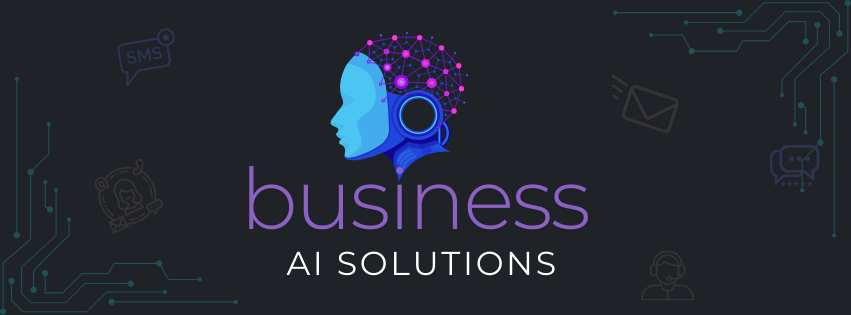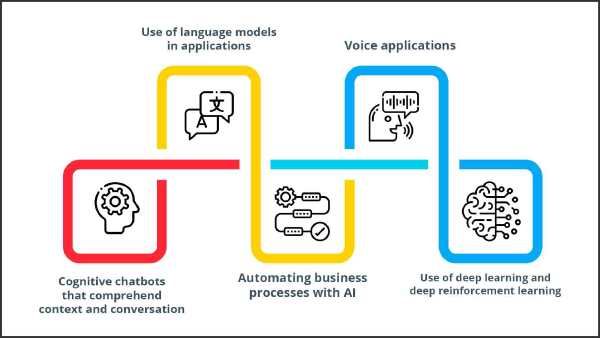Navigating the Future: Leveraging AI Answering Agents in Business Strategy
The Rise of AI Answering Agents


Intelligent by design
In recent years, there has been a remarkable surge in the adoption of AI answering agents across various industries. These intelligent systems have transcended their traditional roles, evolving into crucial components of customer engagement strategies. Imagine a scenario where a customer reaches out at midnight with a query—thanks to AI answering agents, they can receive prompt and accurate responses, enhancing satisfaction and loyalty.
As more businesses recognize the potential of AI to optimize communication, the adoption curve has steepened. According to recent studies, companies that implement AI solutions observe a significant reduction in response time and operational costs, which are vital for maintaining a competitive edge.
Importance of AI in Business Strategy
The integration of AI into business strategy is no longer optional; it's necessary.
Here are a few key reasons why:
- Cost Efficiency: Automating customer interactions can substantially lower labor costs.
- 24/7 Availability: AI answering agents ensure that customers can get support at any hour.
- Scalability: Businesses can handle increasing volumes of inquiries without compromising service quality.
By leveraging AI, companies are not only streaming their operations but also personalized crafting experiences, which can lead to higher conversion rates and customer retention.
This strategic shift is setting the stage for a new era in customer relations, where technology and human insight work in harmony to create sophisticated support ecosystems.
Understanding AI Answering Agents
How AI Answering Agents Work
To truly appreciate AI answering agents, it's essential to understand their mechanisms. These sophisticated tools leverage artificial intelligence technologies such as natural language processing (NLP) and machine learning to interact with customers seamlessly.
Picture this: When a customer types in a question, the AI analyzes the intent behind the words and retrieves the most relevant information from a vast database.
Here's a simplified breakdown of the process:
- Input Processing: Customer queries are processed in real-time, identifying keywords and sentiment.
- Contextual Understanding: AI systems utilize historical data to provide contextually relevant responses.
- Response Generation: Based on programmed algorithms, the agent formulates responses that mimic human-like communication.
This technology ensures that customer interactions feel personal and intuitive.
Benefits of Implementing AI Answering Agents
Implementing AI answering agents offers businesses a multitude of advantages:
- Improved Response Times: Customers receive instant replies, leading to a reduction in wait times.
- Enhanced Accuracy: With access to extensive databases, AI can provide more reliable information than a human might in a stressful situation.
- Cost-Effectiveness: Reducing the need for extensive staff allows for significant savings.
Moreover, by filtering inquiries, these agents enable human representatives to focus on more complex tasks, enhancing overall productivity and job satisfaction. In essence, the adoption of AI answering agents not only transforms customer engagement but also benefits the entire organization.
Integrating AI Answering Agents in Customer Service
Enhanced Customer Experience
Integrating AI answering agents into customer service is revolutionizing the way companies interact with their customers. Imagine calling a customer service line and reaching a friendly voice ready to assist—this is now a reality, albeit a virtual one.
AI answering agents can provide fast, relevant, and, most importantly, personalized responses that enhance the overall customer experience.
- Personalization: AI can remember past interactions, allowing for tailored responses.
- Speed: With immediate availability, customers no longer have to wait on hold, dramatically improving their experience.
- Accessibility: 24/7 support means that whether it's a holiday or a weekend, help is just a message away.
This level of responsiveness not only fosters customer loyalty but also builds a strong brand reputation.
Streamlining Customer Support Processes and Service Accuracy
Beyond enhancing customer experience, AI answering agents streamline essential support processes. By automating routine inquiries, businesses can achieve greater efficiency.
For instance:
- Query Filtering: AI can categorize customer queries, ensuring that complex issues reach human representatives while common questions are resolved instantly.
- Reducing Errors: With access to real-time data, AI ensures that the information provided is accurate and up-to-date.
This streamlined approach not only saves time for both customers and employees but also boosts service accuracy significantly. By allowing agents to concentrate on high-value tasks, organizations can increase overall productivity and ensure that every customer interaction is as effective as possible. The balance achieved through AI integration creates a robust support system that ultimately drives business success.
Utilizing AI Answering Agents for Marketing
Personalized Marketing Campaigns
The integration of AI answering agents doesn't stop at customer service; They play a pivotal role in crafting personalized marketing campaigns as well. Imagine exploring an online store where recommendations feel tailored just for you—this is the power of AI.
By analyzing customer interactions and preferences, these agents can help develop campaigns that resonate on a personal level.
- Customer Profiles: AI can compile data on individual preferences, enabling marketers to design targeted offers.
- Dynamic Content: By adjusting messages in real-time, brands can present relevant content based on a user's behavior.
This personalization not only captures attention but also enhances engagement, leading to higher conversion rates.
Targeted Customer Messaging
Speaking of engagement, AI answering agents stand out in their ability to deliver targeted customer messaging.
This involves:
- Segmentation: By sorting customers based on behavior and interests, businesses can create hyper-targeted communications.
- Timing: AI determines the best times to reach out, ensuring that messages land when customers are most receptive.
This level of specificity means that messages aren't just delivered—they resonate.
Discover Data Insights on What Customers Want
Perhaps one of the most significant advantages of utilizing AI answering agents is their ability to uncover valuable data insights. By continuously analyzing customer interactions, businesses can gain a clearer picture of evolving customer needs and preferences.
- Trend Analysis: Identifying patterns in customer queries can help businesses anticipate future demand.
- Feedback Loops: AI can highlight common pain points, enabling companies to adjust their offerings accordingly.
In this data-driven marketing landscape, leveraging AI insights ensures that businesses stay ahead of the curve, ultimately fostering customer loyalty and boosting sales. By utilizing AI answering agents creatively, companies transform their marketing strategies into powerful tools that not only reach but resonate with their audience.
Optimizing Sales with AI Answering Agents
Lead Qualification and Nurturing
As businesses strive to maximize their sales potential, AI answering agents have emerged as vital tools for lead qualification and nurturing. Imagine an automated system that can sift through numerous inquiries daily, efficiently identifying which leads are worth pursuing.
This isn't just a dream; it's the reality fostered by AI.
- Criteria Assessment: AI agents can score leads based on predefined criteria, such as budget, need, and urgency, enabling sales teams to focus on high-quality prospects.
- Continual Engagement: Once a lead is qualified, AI can nurture the relationship through timely follow-ups and personalized content, ensuring that potential customers feel valued and informed.
This proactive approach not only streamlines the sales process but also deepens relationships, ultimately driving conversions.
Improving Sales Performance
Beyond lead qualification, AI answering agents contribute significantly to improving overall sales performance. By taking the grunt work off the shoulders of sales teams, they free representatives to focus on strategy and closing deals.
Here's how:
- Data-Driven Insights: AI can analyze customer interactions to reveal key buying patterns, empowering sales teams with valuable insights.
- Performance Monitoring: Automated tracking of sales activities allows leaders to identify successful strategies and areas needing improvement.
These optimizations mean that sales teams operate with enhanced clarity and efficiency, driving better results. By effectively leveraging AI answering agents, businesses can create a robust sales framework that not only attracts leads but converts them into loyal customers, ensuring sustainable growth in competitive markets.
Challenges and Considerations in Implementing AI Answering Agents
Data Privacy and Security
While AI answering agents offer immense advantages, it's crucial to address the challenges that accompany their implementation. One of the primary concerns is data privacy and security.
With AI systems processing sensitive customer information, businesses must prioritize safeguarding this data to maintain trust.
- Regulatory Compliance: Companies must navigate complex regulations such as GDPR and CCPA, ensuring that they handle data responsibly and transparently.
- Encryption and Security Measures: Implementing robust security protocols, such as data encryption and secure access controls, protects customer information from potential breaches.
For example, a company that neglects these factors can face significant legal ramifications and damage to its reputation—a risk not worth taking.
Integration with Existing Systems
Another significant challenge is ensuring seamless integration of AI answering agents with existing systems. Struggling with compatibility can hinder the effectiveness of AI technology in enhancing operations.
Considerations include:
- System Compatibility: Businesses must whether assess their current CRM and communication tools can work harmoniously with AI agents.
- Training and Adoption: Employees should be adequately trained to utilize AI tools effectively, maximizing their potential.
Navigating these integration hurdles requires careful planning and foresight. However, businesses that successfully address these challenges can unlock the full potential of AI answering agents, propelling them towards greater efficiency and customer satisfaction. The journey may be complex, but the benefits ultimately justify the effort.
Future Trends in AI Answering Agents
Voice and Natural Language Processing Advancements
As we look towards the future, one of the most exciting trends in AI answering agents is the continued advancement of voice and natural language processing (NLP) technologies. These enhancements will significantly improve how customers interact with AI systems.
Imagine being able to speak naturally, like chatting with a friend, and receiving accurate responses in real-time—this is becoming increasingly feasible.
- Contextual Understanding: Future AI agents will be better at understanding context, allowing for deeper conversations that feel genuine.
- Multilingual Capabilities: Enhanced NLP will enable AI to communicate fluently across various languages, broadening their accessibility.
For customers, this means more meaningful interactions that cater to their unique preferences, enhancing overall satisfaction.
AI Answering Agents in Virtual Reality Environments
Another emerging trend is the incorporation of AI answering agents into virtual reality (VR) environments.
With the rise of remote interactions, businesses are exploring how VR can create immersive customer experiences.
- Virtual Assistants: Imagine entering a virtual store where an AI answering agent welcomes you and guides you through the selection process, providing information in a more relevant and engaging way.
- Training and Simulations: Companies may also use VR for employee training, leveraging AI agents to simulate real-world customer interactions.
These developments will redefine customer engagement, making interactions more interactive and enjoyable. By embracing these future trends, businesses can position themselves at the forefront of innovation, ultimately enhancing both user experiences and operational efficiency.
As AI technology evolves, the possibilities seem limitless, ushering in a new era of customer interaction!






